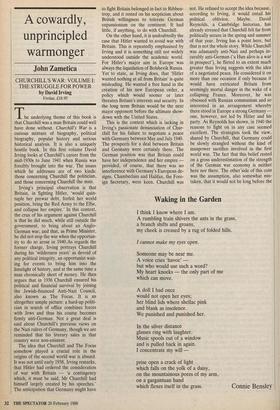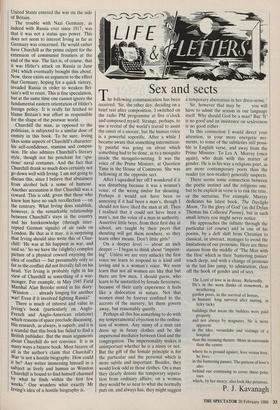A cowardly, unprincipled warmonger
John Zametica
CHURCHILL'S WAR: VOLUME I: THE STRUGGLE FOR POWER by David Irving
Veritas, f16.95
The underlying theme of this book is that Churchill was a man Britain could well have done without. Churchill's War is a curious mixture of biography, political biography, popular history and serious historical analysis. It is also a uniquely hostile book. In this first volume David Irving looks at Churchill's career from the mid-1930s to June 1941 when Russia was forcibly brought into the war. The issues which he addresses are of two kinds: those concerning Churchill the politician, and those concerning Churchill the man.
Irving's principal observation is that Britain, in fighting Hitler, 'would quin- tuple her prewar debt, forfeit her world position, bring the Red Army to the Elbe, and collapse her empire.' In this context, the crux of his argument against Churchill is that he did much, while still outside the government, to bring about an Anglo- German war; and that, as Prime Minister, he did not stop the war when the opportun- ity to do so arose in 1940.As regards the former charge, Irving portrays Churchill during his 'wilderness years' as devoid of any political integrity, an opportunist wait- ing for events to bring him into the limelight of history, and at the same time a man chronically short of money. He then argues that in 1936 Churchill ensured his political and financial survival by joining the Jewish-financed Anti-Nazi Council, also known as The Focus. It is an altogether simple picture: a hard-up politi- cian in search of office combines forces with Jews and thus his course becomes firmly anti-German. Not a great deal is said about Churchill's previous views on the Nazi rulers of Germany, though we are reminded that his literary sales in that country were non-existent.
The idea that Churchill and The Focus somehow played a crucial role in the origins of the second world war is absurd. It was not until early 1938, Irving remarks, that Hitler had ordered the consideration of war with Britain — `a contingency which, it must be said, Mr Churchill had himself largely created by his speeches.' The anticipation that Germany might have to fight Britain belonged in fact to Ribben- trop, and it rested on his scepticism about British willingness to tolerate German expansionism on the continent. It had little, if anything, to do with Churchill.
On the other hand, it is undoubtedly the case that Hitler wanted to avoid war with Britain. This is repeatedly emphasised by Irving and it is something still not widely understood outside the academic world. For Hitler's major aim in Europe was always the liquidation of Bolshevik Russia. Yet to state, as Irving does, that `Hitler wanted nothing at all from Britain' is quite misleading. He wanted a free hand in the creation of his new European order, a policy which would sooner or later threaten Britain's interests and security. In the long term Britain would be the next major opponent before the ultimate show- down with the United States.
This is the context which is lacking in Irving's passionate denunciation of Chur- chill for his failure to negotiate a peace with Germany between May and July 1940. The prospects for a deal between Britain and Germany were certainly there. The German position was that Britain could have her independence and her empire provided, of course, that there was no interference with Germany's European de- signs. Chamberlain and Halifax, the Fore- ign Secretary, were keen. Churchill was not. He refused to accept the idea because, according to Irving, it would entail his political oblivion. Maybe. David Reynolds, a Cambridge historian, has already stressed that Churchill felt far from politically secure in the spring and summer of that year. Irving has a point here, but that is not the whole story. While Churchill was adamantly anti-Nazi and perhaps in- curably anti-German Ca Hun alive is a war in prospect'), he flirted to an extent much greater than Irving suggests with the idea of a negotiated peace. He considered it on more than one occasion if only because it would have extricated Britain from seemingly mortal danger in the wake of a collapsing France. Moreover, he was obsessed with Russian communism and so interested in an arrangement whereby there stood in Europe a strong Germany one, however, not led by Hitler and his party. As Reynolds has shown, in 1940 the reasons to fight on in any case seemed excellent. The strategists took the view, shared by Churchill, that Germany could be slowly strangled without the kind of manpower sacrifice involved in the first world war. The fact that this belief rested on a gross underestimation of the strength of the German war economy is neither here nor there. The other'side of this coin was the assumption, also somewhat mis- taken, that it would not be long before the United States entered the war on the side of Britain.
The trouble with Nazi Germany, as indeed with Russia ever since 1917, was that it was not a status quo power. This does not seem to interest Irving as far as Germany was concerned. He would rather have Churchill as the prime culprit for the extension of communist frontiers at the end of the war. The fact is, of course, that it was Hitler's attack on Russia in June 1941 which eventually brought this about. Now, there exists an argument to the effect that Germany, hoping for a quick victory, invaded Russia in order to weaken Bri- tain's will to resist. This is fine speculation, but at the same time one cannot ignore the fundamental eastern orientation of Hitler's foreign policy. It is really far fetched to blame Britain's war effort as responsible for the shape of the postwar world.
Churchill the man, as opposed to the politician, is subjected to a similar dose of enmity in this book. To be sure, Irving likes some aspects of Churchill's character: his self-confidence, stamina and compas- sion. He also admires Churchill's literary style, though not his penchant for 'spu- rious' naval costumes. And the fact that Churchill drank so much does certainly not go down well with Irving. I am not going to discuss this, since I believe that abstainers from alcohol lack a sense of humour. Another accusation is that Churchill was a coward. This is odd, given that those who knew him have no such recollection — on the contrary. What Irving does establish, however, is the remarkable relationship between Churchill's stays in the country and his foreknowledge (through inter- cepted German signals) of air raids on London. Be that as it may, it is surprising that Irving. should also write this of Chur- chill: 'He was at his happiest in war, and said so.' So we have the (slightly) complex picture of a physical coward enjoying the idea of conflict — but presumably only so far as the conflict did not literally fall on his head. Yet Irving is probably right in his view of Churchill as something of a war- monger. For example, in May 1945 Field Marshal Alan Brooke noted in his diary: `Winston . . . already longing for another war! Even if it involved fighting Russia!' There is much of interest and value in Irving's book (particularly on Anglo- French and Anglo-American relations) which reasons of space preclude discussing. His research, as always, is superb, and it is a scandal that this book has failed to find a British publisher. But the main arguments about Churchill do not convince. It is in many ways a bizarre book. Most bizarre of all is the author's claim that Churchill's War 'is not a hostile biography. How could it be? Any writer immersing himself in a subject as lively and human as Winston Churchill is bound to find himself charmed by what he finds within the first few weeks.' One wonders what exactly Mr Irving's idea of a hostile biography is.



















































 Previous page
Previous page